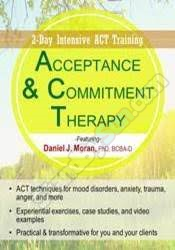Daniel J Moran - Acceptance & Commitment Therapy, 2-Day Intensive ACT Training

Looking to improve your therapy approach?
How often do you review your appointment calendar and start wondering how you’re going to, finally, help a regular client who seems to progress for a while – and then regress?
Each time he/she arrives, you use the same tools and techniques you’ve used for so long – and mostly successfully – but this one client is testing your skills. Now you can begin to integrate Acceptance and Commitment Therapy (ACT) into your practice – and see improved outcomes.
Researched and developed by world-renowned researcher, speaker and author Steven Hayes, PhD, ACT is fast becoming the treatment approach that gets to the heart of therapeutic relationship.
Watch ACT expert, trainer and co-author with Steven Hayes of ACT in Practice, Daniel J. Moran, Ph.D., BCBA-D, for this course recording where you will develop highly practical, evidence-based skills, case conceptualization techniques and powerful strategies that will improve outcomes for the following:
- Anxiety Issues
- Post-Traumatic Stress Disorder
- Mood Disorders
- Substance Abuse
- Anger Management
- Eating Disorders
- Trauma
- Personality Disorders
Watch this intensive, engaging and transformative recording and start a new path for healing you can use with your most difficult clients.
Free mindfulness exercises are included! You will also receive copies of ACT-based psychological assessment tools and case conceptualization forms.
- Develop a deep understanding of the six core processes of Acceptance and Commitment Therapy (ACT) to help clients advance psychological flexibility.
- Incorporate the role of psychological flexibility in ACT and list clinical techniques for increasing it.
- Utilize acceptance approaches with avoidance problems to strengthen a client’s willingness to have emotions.
- Implement clinical skills for helping clients to defuse from language obstacles.
- Utilize exercises in therapy with clients like, contacting the present moment, to aid clients with developing flexibility to engage in the present moment and let go of their struggles.
- Detect how a client’s unclarified values can lead to clinical problems in relation to assessment and treatment planning.
- Integrate ACT into different therapeutic styles and methods as an approach to managing symptoms.
- Create committed action plans for clients with anxiety disorders to improve level of functioning.
- Use metaphors to undermine language-based avoidance repertoires to improve client engagement.
- Implement emotional and behavioral willingness techniques with clients to reduce experiential avoidance.
- Integrate ACT techniques into treatment for specific disorders including depression, anxiety, trauma and the personality disorders.
- Demonstrate how ACT incorporates elements of exposure therapy to reduce experiential avoidance.
The ACT Model
- The nature of human suffering
- ”Healthy normality” is a myth
- Language: The double-edged sword
- Undermine unhelpful thoughts
- Aiming for psychological flexibility and why
- The ACT hexagon model
Limitations of the Research and Potential Risks
- Children and adolescents
- Acute, florid hallucinations
- Catatonic depression
- Individuals with an adverse reaction to mindfulness exercises
Acceptance
- Strengthening a willingness to have emotions
- The opposite of acceptance is experiential avoidance
- Experiential avoidance throughout the lifespan
- Why acceptance is important
- Case example: Teenage shyness & hoarding
Defusion
- Look at thoughts rather than from thoughts
- Deal with automatic thoughts
- The power of words
- The problem with cognitive fusion
- Address CBT-based disputation techniques with defusion
- ”Taking your mind for a walk” exercise
- Case example: Eating disorders & social phobia
Perspective-Taking
- Understand the “Self” in ACT
- Self-as-content, self-as-perspective, self-as-context
- Observer self-exercise
- Deal with identity issues
- Case examples related to PTSD & childhood sexual trauma
Mindfulness
- Contacting the present moment
- Why being in the here-and-now is critical for mental health
- Relationship between mindlessness and psychopathology
- Meditation, mindfulness and mindful action
- Exercises for mindful action
- Case example: Anger, personality disorders, alcoholism
Would you like to receive Daniel J Moran - Acceptance & Commitment Therapy, 2-Day Intensive ACT Training ?
Values Work
- The positive side of language
- Identifying core values
- Differentiate values and goals
- Writing values-based treatment goals
- The ethics of values clarification
- Establishing the life line
- Case example: Heroin addiction, bipolar disorder
Committed Action
- Define “commitment” objectively
- Integrate evidence-based therapy with ACT
- Develop ACT-based behavior therapy treatment plans
- Improve behavioral activation with ACT
- Accelerate exposure therapy with ACT
- Case example: Depression, agoraphobia
Pulling It All Together
- Hexaflex model for psychological flexibility
- Ask the “ACT Question” for self-help and case conceptualization
- Inflexahex model: Diagnosis from an ACT approach
- Case example: Obsessive-compulsive disorder
Incorporate ACT into Your Own Approach
- Social skills training
- Applied Behavior Analysis
- Inpatient treatment programs systems
- Exposure and ritual prevention
- Behavioral activation
- Parent management training
- Executive coaching
The Mindful Action Plan
- ACT simplified
- Passengers on the bus: The classic ACT group exercise
- How ACT can make you a better therapist